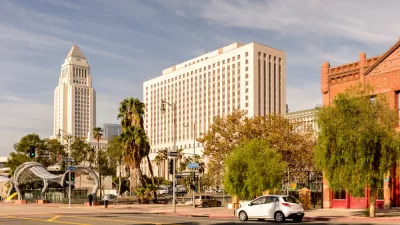Los Angeles is experiencing an elevated anti-growth conversation and suspicion of insider dealings at City Hall. In the midst of this, a councilmember known as an "outsider" aims to reconcile his constituents with the city's development processes.
David Ryu represents the Fourth District, a region rich with iconic L.A. landmarks: "Museum Row, Griffith Park, Runyon Canyon, the Hollywood sign, the Original Farmer’s Market, and the Grove are all in CD 4. We have everything."
Neighborhoods within the district are concerned with the impacts of congestion and mansionization. Some are now clamoring for inclusion in the city's Baseline Mansionization Ordinance.
Ryu is supporting his constituents' push for temporary moratoriums on oversized residential projects. But he says his short time in office has already taught him that growth isn’t at the core of development conflicts.
"During the campaign, it seemed on the surface like the community was frustrated about development," he tells The Planning Report. "But the root issue is lack of trust and lack of communication with government."
The former healthcare professional's platform blasted City Hall relationships with developers—a source of public suspicion that Ryu says is the real impetus behind putatively anti-growth efforts like the Neighborhood Integrity Initiative. During his campaign, Ryu refused, and in some cases returned, donations from developers. Now in office, he means to build community trust in the development process from the ground up.
"When it comes to planning, it’s about first gaining trust around the small things, like potholes or tree trimming," he says. "Constituents have to feel confident in these small things so that when you say you’re going to do bigger things, they have that trust."
One project in the works aims to ease the pain of overcrowded tourist destinations with a transportation-management plan, which Ryu hopes will ultimately link popular landmarks, their surrounding neighborhoods, and Metro stations throughout the district.
In The Planning Report, Ryu argues that paying attention to community concerns and adhering to an open process can pay off for developers by increasing efficiency, rather than bogging projects down.
"If you’re a developer, you can show me a nice presentation and I can give you all the zoning variances and zone changes you want, but guess what happens? A lawsuit," he says. "Whether you win or lose is irrelevant: For business, time is money. Getting held up for one to two years in litigation doesn’t help anybody."
Of course, "getting held up" is a problem for the city, too, and Ryu recognizes that it isn’t necessarily a consequence of corruption: City Hall has not recovered from cuts to staff during the 2008 recession, nor from disinvestment in professional development and capacity-building technology.
FULL STORY: LA City Councilmember Ryu’s Top Priority: Constituent Engagement to Build Public Trust

Alabama: Trump Terminates Settlements for Black Communities Harmed By Raw Sewage
Trump deemed the landmark civil rights agreement “illegal DEI and environmental justice policy.”

Planetizen Federal Action Tracker
A weekly monitor of how Trump’s orders and actions are impacting planners and planning in America.

The 120 Year Old Tiny Home Villages That Sheltered San Francisco’s Earthquake Refugees
More than a century ago, San Francisco mobilized to house thousands of residents displaced by the 1906 earthquake. Could their strategy offer a model for the present?

In Both Crashes and Crime, Public Transportation is Far Safer than Driving
Contrary to popular assumptions, public transportation has far lower crash and crime rates than automobile travel. For safer communities, improve and encourage transit travel.

Report: Zoning Reforms Should Complement Nashville’s Ambitious Transit Plan
Without reform, restrictive zoning codes will limit the impact of the city’s planned transit expansion and could exclude some of the residents who depend on transit the most.

Judge Orders Release of Frozen IRA, IIJA Funding
The decision is a victory for environmental groups who charged that freezing funds for critical infrastructure and disaster response programs caused “real and irreparable harm” to communities.
Urban Design for Planners 1: Software Tools
This six-course series explores essential urban design concepts using open source software and equips planners with the tools they need to participate fully in the urban design process.
Planning for Universal Design
Learn the tools for implementing Universal Design in planning regulations.
Clanton & Associates, Inc.
Jessamine County Fiscal Court
Institute for Housing and Urban Development Studies (IHS)
City of Grandview
Harvard GSD Executive Education
Toledo-Lucas County Plan Commissions
Salt Lake City
NYU Wagner Graduate School of Public Service





























